Taste the vibrant flavors of the Mediterranean with our Zaatar & Lemon Roasted Cornish Hens. Infused with the aromatic essence of zaatar and the bright zing of lemon, this recipe marries golden potatoes and sweet cipollini onions in a dish that delights and impresses with every bite.
Roasted Cornish Hens are one of my favorite go-to meals—quick, flavorful, and perfect for weeknight dinners or special occasions. This Mediterranean-inspired version features juicy hens seasoned with za’atar, lemon, and garlic, then roasted alongside golden potatoes and sweet cipollini onions. It’s a one-pan dish that’s both easy and impressive.
I love serving it with a cucumber yogurt salad or salata baladi to complete the fresh, zesty flavors. Whether you’re new to Cornish hens or just looking for a delicious twist, this recipe is a flavorful way to bring the Mediterranean to your table.
Ingredients for Your Roasted Cornish Hens Recipe
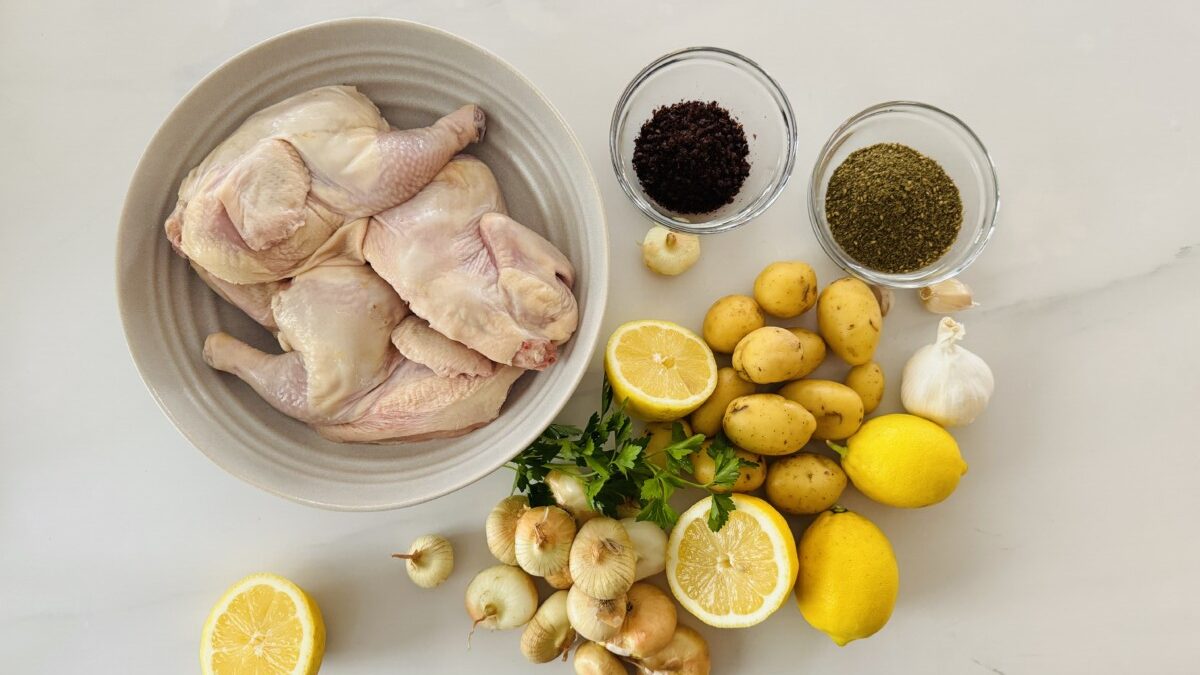
Ready to create a flavorful masterpiece!
- Cornish Hens: 2 Cornish hens, each cut in half, washed, and pat dry. For best results, consider marinating the hens daily to deepen the flavors.
- Potatoes: 1 lb golden potatoes, cut lengthwise and in half. The skins are left on for texture and added nutrients. While golden potatoes are preferred for their buttery texture, Yukon or other varieties can be substituted as long as they are cut into small pieces for even cooking.
- Cipollini Onions: 8 oz of cipollini onions add a sweet and mellow flavor. If unavailable, pearl onions, shallots, or sweet onions can be substituted. Ensure they are cut into medium sizes for uniform cooking.
- Zaatar Mix: 4 tablespoons. This aromatic herb, sesame, and sumac blend add a quintessential Mediterranean flavor. Reserve one tablespoon to sprinkle over the dish just before serving for an extra flavor.
- Sumac: 2 tablespoons. This tangy and lemony spice complements the zaatar and adds a beautiful color to the dish.
- Garlic: 8 cloves minced. Adjust the amount according to your preference, but don’t shy away from using a generous amount to infuse the dish with a rich garlic flavor.
- Lemon Juice: 3/4 cup of fresh lemon juice, with 1/4 cup set aside. The reserved lemon juice is mixed with olive oil and added in the last five minutes of cooking for a fresh zest.
- Olive Oil: 3 tablespoons for cooking, plus an additional tablespoon mixed with the reserved lemon juice. Choose a high-quality olive oil for the best taste.
Cooking Tips for Perfect Roasted Cornish Hens
- Marinating the Hens: If you have the time, let the hens soak in the marinade for a couple of hours. This isn’t just about flavor; it’s about transforming a simple meal into something spectacular.
- Preparing Your Vegetables: When it comes to your veggies, size does matter. Cut your potatoes and onions into uniform sizes to ensure they cook at the same pace as your hens. It’s a simple step, but it makes all the difference in achieving that perfect doneness across all dish components.
- Adjusting on the Fly: Here’s the scoop—sometimes, not everything cooks at the same rate, and that’s okay! If you peek into your oven and see those potatoes lagging behind, don’t panic. Just gently remove the chickens and give those potatoes and onions a little extra time to catch up. About 10 minutes should do the trick.
- Bringing it All Back Together: Once those veggies are tender and ready, add your hens back into the mix. This is your moment to crank up the heat and get a nice broil on those birds.
- The Final Flourish: In the last five minutes, that’s when you make your move with the lemon-olive oil mixture. Drizzle it over the hens and watch it work its magic, adding a fresh zest to wake up all those rich, roasted flavors. It’s your secret weapon for a finish that’s nothing short of show-stopping.
What to Serve with Za’atar & Lemon Cornish Hens
Looking for the perfect side? Here are some favorites that pair effortlessly with the bold, zesty flavors of these hens.
-
Cool & Refreshing: Try a cucumber yogurt salad or tzatziki for a fresh, creamy balance.
-
Hearty & Traditional: Vermicelli rice or Greek lemon rice adds comfort without overpowering.
-
Bright & Crunchy: A crisp fattoush or classic Greek salad brings color and crunch to your plate.
Want more ideas? Don’t miss my Cornish hen with hashweh rice—another Middle Eastern favorite worth trying.
Step-by-Step Instructions
Prepare the Marinade:

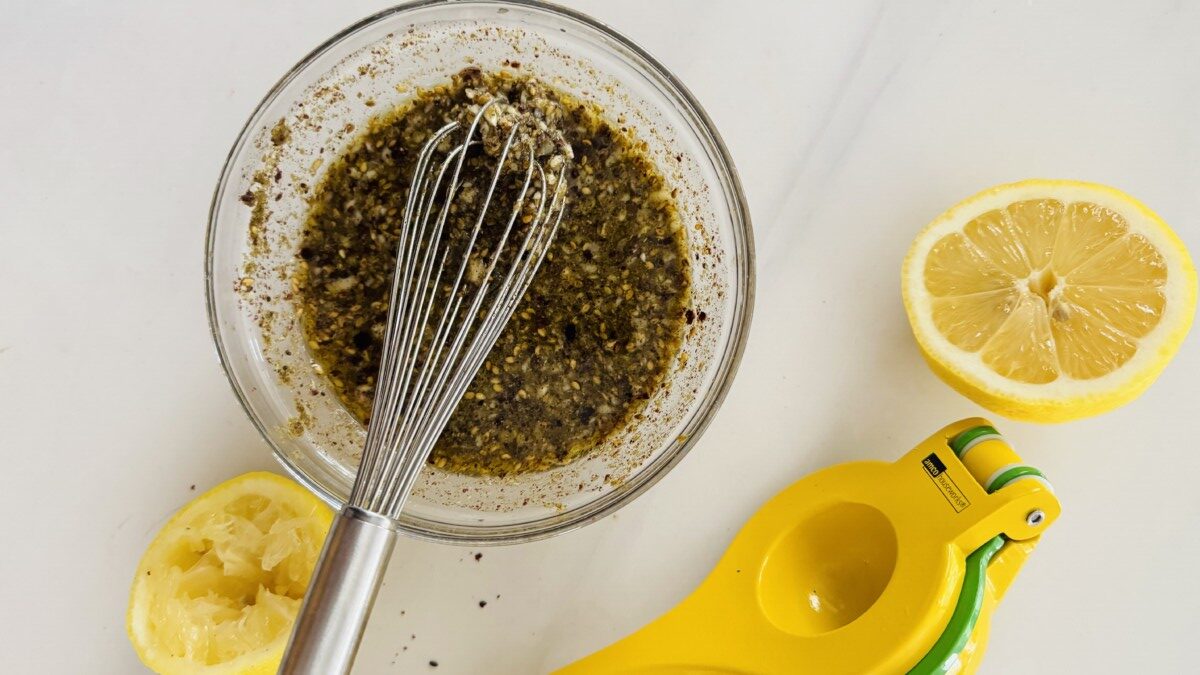
(Optional) For deeper flavor, marinate the Cornish hens in half the marinade for at least 2 hours or overnight in the fridge. Reserve the other half for the vegetables.
Arrange the Hens and Vegetables
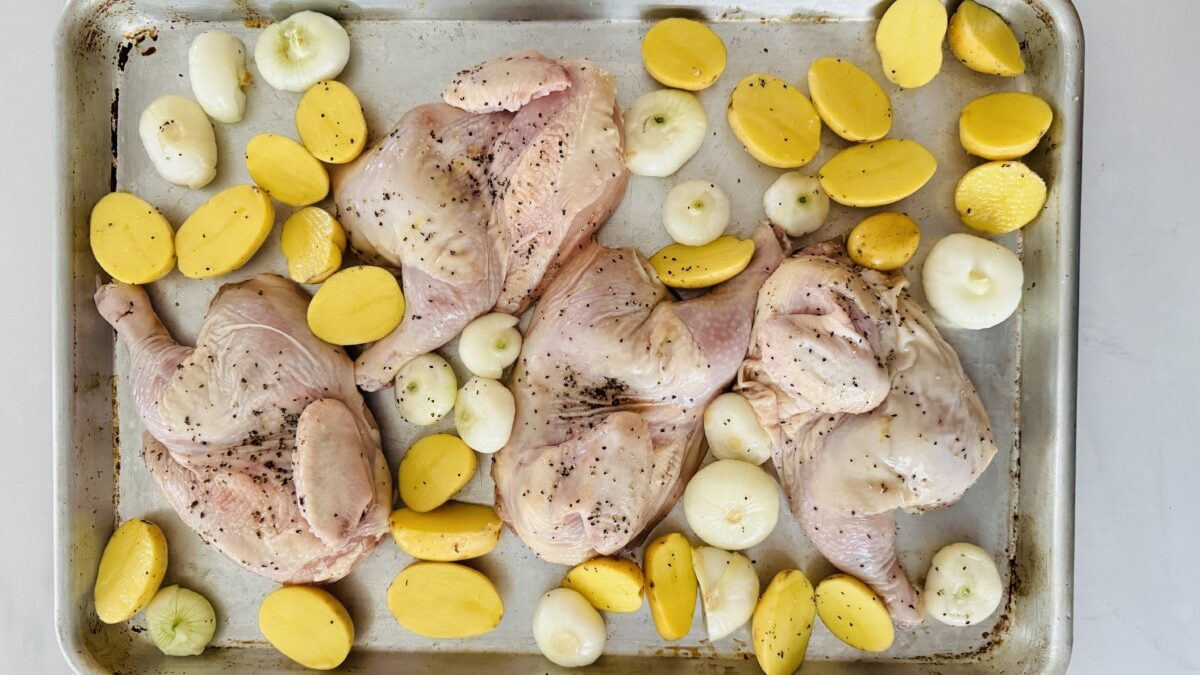
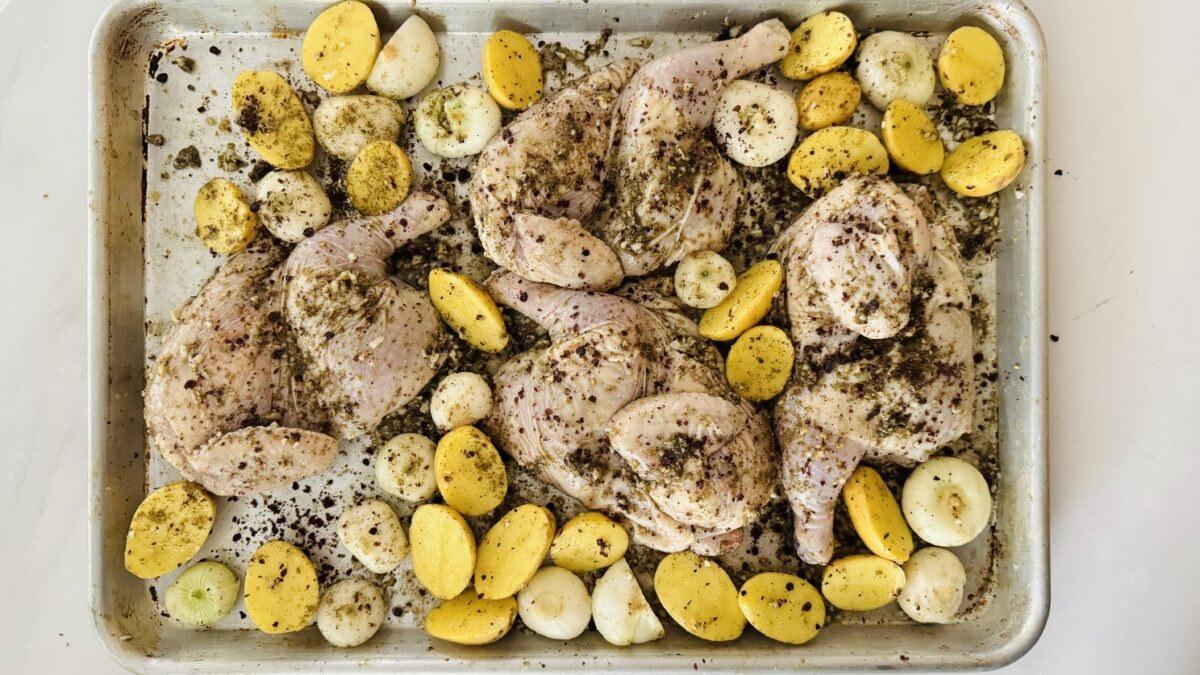
In a large baking tray, arrange the Cornish hens with the potatoes and onions scattered around them.
If you marinate the hens, place them directly onto the tray with the marinade.
If not, pour the reserved marinade evenly over the hens and vegetables, making sure both sides of the hens are well-coated.
Add 1 cup of water to the side of the tray—this creates a moist roasting environment to keep everything juicy and tender.
Cover and Roast:
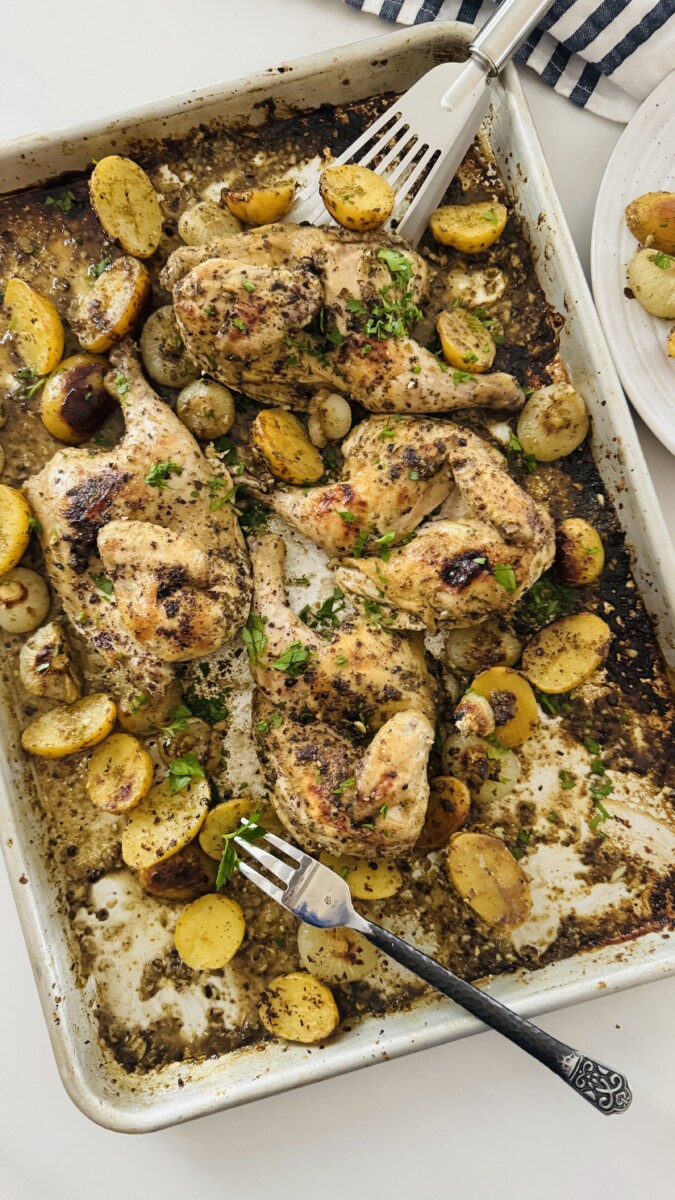
Uncover and finish cooking: Remove the foil and roast for an additional 10 minutes, or until the hens are golden and the vegetables are tender.
Optional Crisp Finish: For extra crispiness, switch the oven to broil for the last 2–3 minutes, keeping a close eye to avoid burning.
Final Drizzle:
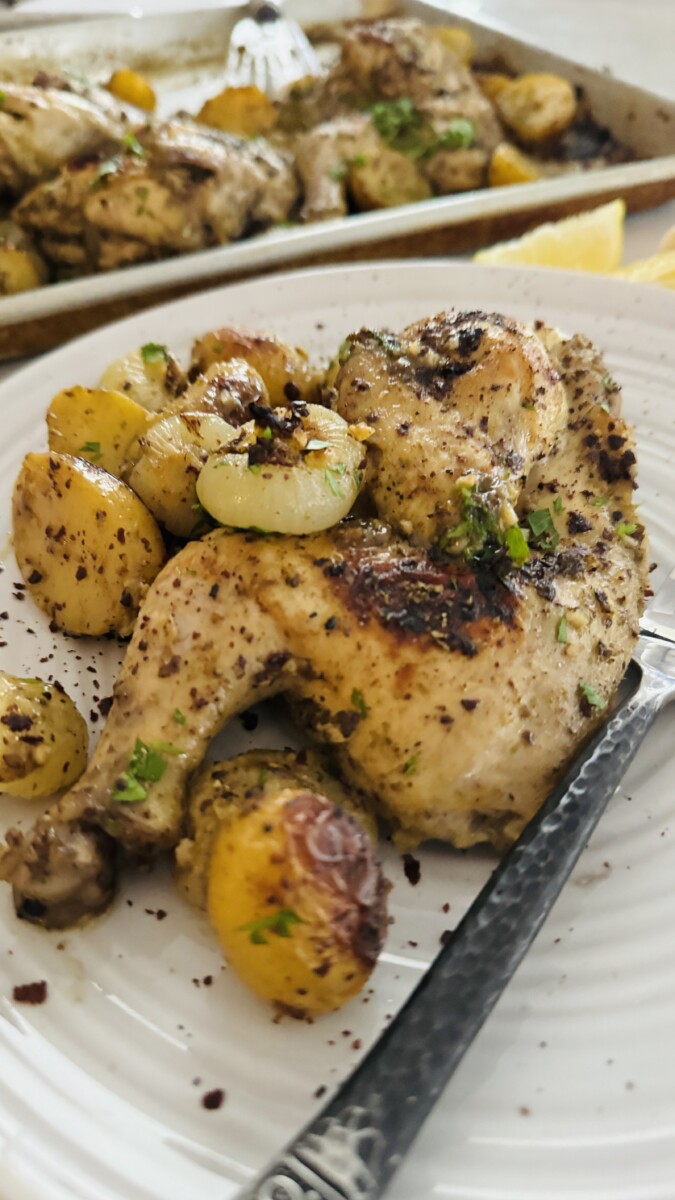
Rest & Serve:
Let the dish rest for a few minutes before serving—this helps the juices redistribute and keeps the hens moist and tender.
Garnish & Enjoy:
Sprinkle with the reserved 1 tablespoon of za’atar and ½ tablespoon of sumac before serving. Plate hot and pair with your favorite side for a complete Mediterranean meal.
Ingredients:
| 2 Cornish hens, halved, washed, and patted dry | |
| 3 tablespoons olive oil | |
| 1/2 cup fresh lemon juice (reserve ¼ cup for later) | |
| 3 tablespoons zaatar (reserve 1 tablespoon for later) | |
| 1 1/2 tablespoons sumac (reserve ½ tablespoon for later) | |
| 8 cloves garlic, minced (adjust to taste) | |
| Salt and pepper to taste | |
| 8 oz cipollini onions, peeled (or substitute) | |
| 1 lb small golden potatoes, cut lengthwise into halves | |
| 1 cup water |
For the Final Drizzle:
| 1/4 cup reserved fresh lemon juice | |
| 1 tablespoon olive oil |
Garnish:
| 1 tablespoon reserved zaatar | |
| 1/2 tablespoon reserved sumac |
Preparation
In a large bowl, whisk together 3 tablespoons olive oil, ½ cup lemon juice, 3 tablespoons za’atar, 1½ tablespoons sumac, minced garlic, salt, and pepper to create the marinade. (Optional) For deeper flavor, marinate the Cornish hens in half the marinade for at least 2 hours or overnight in the fridge. Reserve the other half for the vegetables.
Preheat your oven to 375°F (190°C). In a large baking tray, arrange the Cornish hens with the potatoes and onions scattered around them. If you marinate the hens, place them directly onto the tray with the marinade. If not, pour the reserved marinade evenly over the hens and vegetables, making sure both sides of the hens are well-coated. Add 1 cup of water to the side of the tray—this creates a moist roasting environment to keep everything juicy and tender.
Cover the tray with foil and roast in the preheated oven for 35 minutes. This helps lock in moisture and allows the flavors to meld as everything cooks. Uncover and finish cooking: Remove the foil and roast for an additional 10 minutes, or until the hens are golden and the vegetables are tender. Optional Crisp Finish: For extra crispiness, switch the oven to broil for the last 2–3 minutes, keeping a close eye to avoid burning.
In the last few minutes of cooking, whisk together the reserved ¼ cup of lemon juice with 1 tablespoon of olive oil and drizzle it over the hens and vegetables. This adds a bright, fresh burst of flavor. Rest & Serve: Let the dish rest for a few minutes before serving—this helps the juices redistribute and keeps the hens moist and tender. Garnish & Enjoy: Sprinkle with the reserved 1 tablespoon of za’atar and ½ tablespoon of sumac before serving. Plate hot and pair with your favorite side for a complete Mediterranean meal.
Nutrition Information
The information shown is an estimate provided by an online nutrition calculator. It should should not be considered a substitute for a professional nutritionist's advice.
See our full nutrition disclosure here.
Subscribe to my newsletter for authentic Mediterranean recipes, essential cooking tips, and the latest food news, all delivered directly to your inbox for FREE. Let’s create memorable dishes together!






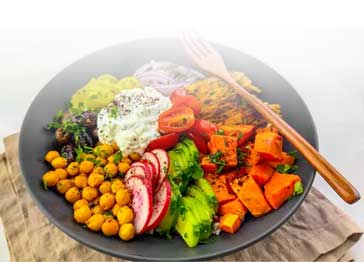
Did you love making this dish, or add your own twist? We’d love to hear from you! Leave a comment below with your experience and any modifications you made. Let’s share the joy of cooking!